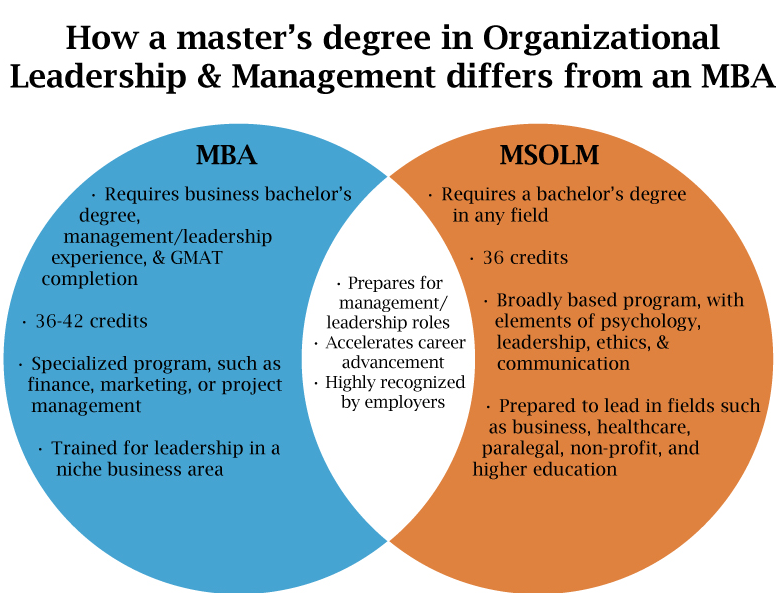Embark on an extraordinary educational adventure with an MBA in Organizational Leadership. This transformative program empowers aspiring leaders with the knowledge, skills, and strategic insights to excel in the dynamic business landscape. Immerse yourself in a comprehensive curriculum that explores the intricacies of organizational behavior, leadership theories, and cutting-edge management practices.
As you delve into the program’s core courses, you’ll master the art of effective communication, strategic planning, financial management, and human resource development. You’ll gain invaluable insights into the latest leadership trends and innovations, equipping you to navigate the complexities of modern organizations with confidence and competence.
Overview of MBA in Organizational Leadership

An MBA in Organizational Leadership is a graduate-level degree program designed to equip individuals with the skills and knowledge necessary to lead and manage organizations effectively. It focuses on developing a deep understanding of organizational behavior, strategic planning, and leadership principles.
Industry Demand
The demand for professionals with an MBA in Organizational Leadership is growing rapidly. According to the U.S. Bureau of Labor Statistics, employment of management analysts, a common career path for MBA graduates, is projected to grow 14% from 2021 to 2031, much faster than the average for all occupations.
Curriculum and Coursework
An MBA in Organizational Leadership curriculum typically comprises core courses that provide a solid foundation in leadership principles and organizational management. These courses are designed to equip students with the knowledge and skills necessary to effectively lead and manage organizations in various industries.
Core Courses
- Leadership and Organizational Behavior:Explores different leadership styles, theories, and their impact on organizational performance. It covers topics such as motivation, communication, conflict management, and team dynamics.
- Strategic Management:Focuses on developing a comprehensive understanding of strategic planning, implementation, and evaluation. Students learn how to analyze industry trends, formulate strategies, and make informed decisions.
- Financial Management:Provides a thorough grounding in financial principles, including budgeting, forecasting, investment analysis, and risk management. It equips students with the skills to make sound financial decisions.
- Marketing Management:Covers the fundamentals of marketing, including market research, consumer behavior, product development, and distribution channels. Students learn how to create and implement effective marketing campaigns.
- Operations Management:Examines the processes and systems involved in managing operations within an organization. It covers topics such as supply chain management, quality control, and lean manufacturing.
- Human Resource Management:Explores the role of human resources in attracting, developing, and retaining talent. Students learn about recruitment, performance management, employee relations, and compensation.
- Information Technology for Management:Introduces students to the use of information technology in managing organizations. It covers topics such as data analytics, enterprise systems, and cybersecurity.
- Ethics and Corporate Social Responsibility:Examines the ethical implications of business decisions and the role of organizations in promoting social responsibility. It covers topics such as corporate governance, sustainability, and stakeholder management.
Benefits and Value Proposition

An MBA in Organizational Leadership offers numerous advantages that enhance your professional trajectory. It empowers you with the skills and knowledge to lead effectively, propelling your career forward and unlocking greater earning potential.
Enhanced Leadership Skills
This degree equips you with a comprehensive understanding of leadership principles, enabling you to excel in managerial roles. You’ll develop essential skills such as strategic thinking, communication, motivation, and conflict resolution, equipping you to inspire and guide teams effectively.
Career Advancement
An MBA in Organizational Leadership opens doors to senior-level positions within organizations. It demonstrates your commitment to professional growth and your ability to lead and manage complex projects and initiatives. Graduates are highly sought after by employers seeking individuals who can drive organizational success.
Increased Earning Potential
Professionals with an MBA in Organizational Leadership typically earn significantly higher salaries compared to those without an advanced degree. The enhanced skills and knowledge acquired through this program empower graduates to take on greater responsibilities and contribute more effectively to their organizations, leading to increased compensation and financial rewards.
An MBA in organizational leadership prepares you to lead and manage teams effectively. If you’re interested in developing your leadership skills further, consider pursuing a master of business leadership. This advanced degree will provide you with the knowledge and tools you need to succeed in today’s competitive business environment.
Upon completion of the MBA in organizational leadership, you’ll be equipped with the skills necessary to lead and inspire your team to achieve success.
Differentiation in the Job Market
An MBA in Organizational Leadership differentiates graduates in the job market by providing them with a unique blend of business acumen and leadership expertise. It signals to potential employers that you possess the skills and capabilities to lead and manage effectively, setting you apart from other candidates.
Program Formats and Delivery

The MBA in Organizational Leadership is offered in various formats to cater to the diverse needs of working professionals. Each format has its own advantages and drawbacks, which we will explore below.
The three main delivery formats are:
- Full-time
- Part-time
- Online
Full-time MBA
Full-time MBA programs are designed for students who can commit to full-time study. They typically last for 12-18 months and involve attending classes on campus several days per week. Full-time programs offer the most immersive and rigorous learning experience, as students are able to focus solely on their studies and engage in hands-on projects and group work.
Part-time MBA
Part-time MBA programs are designed for working professionals who need to balance their studies with their careers. They typically last for 2-3 years and involve attending classes on campus one or two evenings per week. Part-time programs offer greater flexibility and allow students to continue working while earning their MBA.
However, they may not offer the same level of immersion and networking opportunities as full-time programs.
Online MBA
Online MBA programs are designed for students who need the flexibility to study at their own pace and from anywhere in the world. They involve completing coursework online through a learning management system and interacting with classmates and professors through virtual discussions and video conferencing.
Online programs offer the greatest flexibility and convenience, but they may lack the face-to-face interaction and networking opportunities of on-campus programs.
Accreditation and Reputation
Accreditation is crucial for MBA programs, ensuring quality and recognition. Reputable accrediting bodies include AACSB International, AMBA, and EQUIS. These accreditations validate program rigor, faculty expertise, and student outcomes.
Reputation and Rankings
The reputation of MBA in Organizational Leadership programs varies. Rankings consider factors such as faculty quality, research impact, career outcomes, and employer reputation. Top-ranked programs include those at Harvard Business School, Wharton School, and Stanford University.
Application Process and Requirements
Admission to an MBA in Organizational Leadership program typically involves a rigorous application process. Understanding the requirements and preparing a strong application package can significantly increase your chances of acceptance.
The application process generally includes submitting the following:
- Online application form
- Official transcripts from undergraduate and any graduate degrees
- GMAT or GRE scores (may vary by program)
- Letters of recommendation
- Personal statement
- Résumé
Application deadlines vary depending on the program. It’s recommended to check with the specific program for their deadlines and submission requirements.
Admission Requirements
Admission committees typically consider the following factors:
- Academic background:A bachelor’s degree with a strong GPA is typically required. Relevant coursework in business or leadership may be advantageous.
- Standardized test scores:GMAT or GRE scores are used to assess quantitative and verbal reasoning skills.
- Work experience:Prior experience in leadership roles can demonstrate your abilities and career aspirations.
- Letters of recommendation:Strong letters from supervisors or colleagues can attest to your leadership skills and work ethic.
- Personal statement:This essay allows you to articulate your career goals and explain why you’re a suitable candidate for the program.
Preparing a Strong Application
To increase your chances of admission, focus on:
- Highlighting your leadership skills:Emphasize experiences that demonstrate your ability to lead and inspire others.
- Tailoring your application:Research the program and tailor your application materials to its specific requirements and mission.
- Proofreading carefully:Ensure your application is free of grammatical errors and typos.
- Seeking feedback:Ask trusted individuals, such as professors or colleagues, to review your application materials and provide feedback.
By following these guidelines and carefully preparing your application, you can increase your chances of admission to the MBA in Organizational Leadership program of your choice.
Tuition and Financial Aid

The tuition costs for MBA in Organizational Leadership programs vary depending on the institution and program format. On average, tuition fees range from $30,000 to $60,000 for the entire program. Executive MBA programs tend to be more expensive due to their accelerated format and additional support services.
Financial aid is available to assist students with the cost of tuition. Scholarships, grants, and loans are common forms of financial assistance. Scholarships are typically awarded based on academic merit, while grants are need-based. Loans, on the other hand, must be repaid after graduation.
If you’re looking for an MBA in organizational leadership, you might also be interested in exploring masters leadership development. This program can help you develop the skills you need to lead and manage teams effectively. An MBA in organizational leadership can provide you with the knowledge and skills you need to succeed in a variety of leadership roles.
Scholarships
Many universities and organizations offer scholarships to MBA students. These scholarships can range from a few thousand dollars to full tuition coverage. Some common scholarship opportunities include:
- Merit-based scholarships: Awarded to students with high GPAs and test scores.
- Need-based scholarships: Awarded to students who demonstrate financial need.
- Diversity scholarships: Awarded to students from underrepresented groups.
- Employer-sponsored scholarships: Awarded to employees of certain companies.
Grants
Grants are another form of financial aid that does not need to be repaid. Grants are typically awarded based on financial need. Some common grant opportunities include:
- Federal Pell Grants: Awarded to undergraduate and graduate students with exceptional financial need.
- Federal Supplemental Educational Opportunity Grants (SEOG): Awarded to undergraduate and graduate students with financial need who are enrolled at least half-time.
- State grants: Awarded to students who are residents of a particular state.
Loans
Loans are a third form of financial aid that must be repaid after graduation. Loans are typically offered by banks, credit unions, and the federal government. Some common loan options include:
- Federal Direct Unsubsidized Loans: Available to all graduate students, regardless of financial need.
- Federal Direct Graduate PLUS Loans: Available to graduate students with good credit.
- Private student loans: Offered by banks and credit unions, with interest rates and repayment terms that vary.
Alumni Network and Career Services
The MBA in Organizational Leadership programs typically offer robust alumni networks and career services to support graduates in their job search and professional development. These resources play a crucial role in connecting graduates with potential employers, providing career guidance, and facilitating ongoing professional growth.
An MBA in organizational leadership equips you with the skills to lead effectively in complex environments. For a deeper dive into leadership principles, consider exploring city of hope leadership. Their programs provide practical insights and tools that can enhance your leadership abilities.
Ultimately, an MBA in organizational leadership, complemented by knowledge from programs like city of hope leadership, empowers you to excel as a transformative leader.
Alumni Network
Alumni networks of MBA in Organizational Leadership programs provide a valuable platform for graduates to connect with fellow alumni, industry professionals, and potential employers. These networks often organize events, workshops, and networking opportunities, enabling graduates to expand their professional connections, share knowledge, and access mentorship opportunities.
Career Services
Career services provided by MBA in Organizational Leadership programs typically include:
Career counseling and guidance
Graduates can receive personalized advice on career planning, resume writing, interview preparation, and job search strategies.
Job search assistance
Career services may provide access to job boards, employer databases, and networking events to help graduates find suitable job opportunities.
Professional development workshops
Programs offer workshops on topics such as leadership skills, communication, and negotiation, enhancing graduates’ professional competencies.
Alumni mentorship programs
Graduates can connect with experienced alumni who provide guidance, support, and insights into career paths and industry trends.These resources collectively contribute to the success of graduates by providing them with the necessary support and opportunities to advance their careers in organizational leadership.
Emerging Trends and Innovations

The field of organizational leadership is constantly evolving, and MBA programs are adapting to reflect these changes. Emerging trends and innovations in leadership include a focus on new approaches to leadership, technology integration, and global perspectives.
New Approaches to Leadership
Traditional models of leadership are being challenged by new approaches that emphasize collaboration, agility, and emotional intelligence. These approaches recognize that leaders must be able to adapt to the changing needs of their organizations and employees.
- Servant leadership: This approach focuses on serving the needs of others, rather than on personal power or authority.
- Adaptive leadership: This approach emphasizes the ability to adapt to changing circumstances and to make decisions that are in the best interests of the organization.
- Emotional intelligence: This approach recognizes the importance of emotional intelligence in effective leadership.
Technology Integration, Mba in organizational leadership
Technology is playing an increasingly important role in leadership. MBA programs are incorporating technology into their curricula to help students develop the skills they need to lead in a digital world.
- Data analytics: Data analytics can be used to improve decision-making, identify trends, and predict future outcomes.
- Artificial intelligence: Artificial intelligence (AI) can be used to automate tasks, provide insights, and improve customer service.
- Virtual reality: Virtual reality (VR) can be used to create immersive learning experiences and to train employees on new skills.
Global Perspectives
The world is becoming increasingly interconnected, and leaders need to be able to understand and operate in a global context. MBA programs are incorporating global perspectives into their curricula to help students develop the skills they need to lead in a global economy.
- Cross-cultural communication: Cross-cultural communication is essential for effective leadership in a global context.
- Global business: Global business courses can help students understand the challenges and opportunities of doing business in a global economy.
- International travel: International travel can provide students with firsthand experience of different cultures and perspectives.
Wrap-Up

An MBA in Organizational Leadership is not merely a degree; it’s an investment in your future as a visionary leader. Graduates of this program emerge as highly sought-after professionals, ready to lead teams, drive innovation, and shape the future of organizations.
With a deep understanding of human dynamics, strategic thinking, and ethical decision-making, you’ll possess the tools to create positive change and inspire those around you.
User Queries
What career opportunities are available to MBA in Organizational Leadership graduates?
Graduates can pursue diverse careers in management, leadership, human resources, consulting, and non-profit organizations.
What is the typical duration of an MBA in Organizational Leadership program?
Full-time programs typically take 1-2 years to complete, while part-time programs may take longer.
What are the key skills developed in an MBA in Organizational Leadership program?
Students develop strong leadership, communication, analytical, problem-solving, and strategic thinking skills.